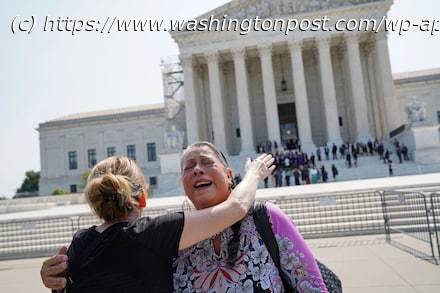At stake was the 1978 Indian Child Welfare Act, passed to remedy the removal of hundreds of thousands of Native children from their homes and tribes.
The Supreme Court on Thursday upheld a federal law, intended to rectify past government abuses, that gives preference to the foster care and adoption of Native American children by their relatives and tribes.
In a 7-2 decision, the court left in place the 1978 Indian Child Welfare Act (ICWA), which was passed to remedy what Congress said was a disgraceful history in which hundreds of thousands of Native American children were removed from their homes by adoption agencies and placed with White families or in group settings.
“Congress’s power to legislate with respect to Indians is well established and broad,” even when it impacts family law, an area that is primarily a state responsibility, Justice Amy Coney Barrett wrote for the majority. “It is true that Congress lacks general power over domestic relations,” Barrett added. “But the Constitution does not erect a firewall around family law.”
Justices Clarence Thomas and Samuel A. Alito Jr. dissented, with Alito writing that the majority “decides one question after another in a way that disserves the rights and interests of these children and their parents, as well as our Constitution’s division of federal and state authority.”
The law was challenged by three non-Indian couples and three states, led by Texas. The plaintiffs contended the law requires state officials to put aside the traditional standard of doing what is best for the child, and relies on racial discrimination in ways the Constitution does not allow. They argued that while Congress has vast power over issues relating to tribes in other areas, it went too far here.
The tribes and their supporters argued that the law is based on political distinctions, not racial ones, and that Congress had decided the law was necessary in part to ensure the tribes had a future. They said the law was meant to rectify a past in which, studies showed, about a third of Native children were removed from their parents for foster care or adoption. Upward of 85 percent of placements were in non-Native homes.
Tribal leaders called the decision a “major victory for Native tribes, children, and the future of our culture and heritage.”
“We hope this decision will lay to rest the political attacks aimed at diminishing tribal sovereignty and creating instability throughout Indian law that have persisted for too long,” said a statement from leaders of the Cherokee Nation, Morongo Band of Mission Indians, Oneida Nation and Quinault Indian Nation.
Home
United States
USA — mix Native adoptions can give priority to tribal families, Supreme Court rules






